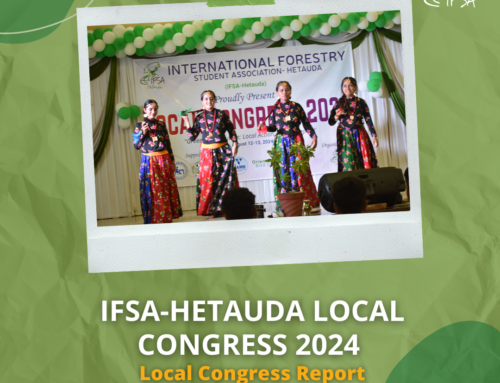I was fortunate enough to be selected to undertake the internship offered at the International Union of Forestry Research Organisations (IUFRO) headquarters on the partnership that IFSA shares with them. We share a strong working relationship with IUFRO who support IFSA in many ways including by providing one of us the opportunity to intern with them each year. They place high value in youth engagement and opinion.
IUFRO is a non-profit, non-governmental, international network of forest scientists, which aims to foster cooperation in forest-related research across the globe. It helps to develop our understanding of the ecological, economic and social aspects of forests and trees. IUFRO is the major network for forest science cooperation globally. Almost 700 member organisations from over 110 countries are enabled to unite through this organisation, reaching out to more than 15,000 scientists whom cooperate on a voluntary basis.
IUFRO attempts to achieve the lofty vision of science-based sustainable forest management globally by advancing research excellence and knowledge sharing through enabling the collaboration of forest-scientists to work on the most critical issues. Its work aims to benefit both forests and people through the development of science-based solutions and policy recommendations. IUFRO is involved in many forms of work regarding the collection and distribution of forest science research.
IUFRO operations is managed at the headquarters in Vienna, Austria, where I was based. Its management is undertaken by a small group of staff at headquarters under the immediate direction of the Executive Director and his deputy. These 10 members of staff facilitate the work of the huge, international network of member organisations, officeholders and scientists that make up IUFRO. Figure 1 describes the organisational structure of IUFRO and the themes of the many task forces, divisions, special projects, programmes and initiatives that it entails.
Learn more about this organization management about at IUFRO StructureAs an intern I was responsible to Alexander Buck, the Executive Director. I completed tasks as they were assigned by Alexander and occasionally other staff. These were often small research tasks that I could do to save him time.
The major task I completed throughout the internship was writing a 15-page literature review into ‘the interaction between forest fires and the carbon cycle in the face of climate change’. This review was required in consideration of a potential Global Forest Expert Panel (GFEP) scientific assessment. Given the predicted impacts of climate change on fire regimes, the occurrence of unprecedented fire activity in recent years and the associated greenhouse gas emissions that come with forest fires; IUFRO is considering facilitating a GFEP assessment that examines the current state of knowledge around these topics and identifies crucial knowledge gaps. Ultimately, they hope to better inform policy to help mitigate the effects of a fire regime that is more frequent, severe and intense; given the potentially disastrous effects to the climate, people, property and biodiversity. My task was to undertake the preliminary research into this topic, firstly to ensure that the assessment is necessary and worthwhile, and secondly to assemble some of the most fundamental research relevant to the topic. The literature review aims to showcase existing research regarding: quantity of emissions from forest fires in relation to the global carbon budget, changing fire regimes in the face of climate change; and the associated implications of this on different biomes, vegetation dynamics, carbon dioxide concentrations and forest fire management.
Aside from this task I assisted on many smaller projects some of which include:
- Assessed candidates and discussed selections for the Wangari Maathai Award of the Collaborative Partnership on Forests;
- Assisted with research tasks on project research and development regarding collaboration of IUFRO with the World Bank, SASSCAL and the Miombo Network (formulating suggestions for IUFROs involvement in the project, discussing ideas, taking minutes);
- Drafted a reply letter in response to an open letter to IUFRO by Venezuelan scientists concerning the current state of Venezuela’s forest science;
- Sent out thank you letters to IUFRO officeholders who organised meetings in 2017;
- Designed several examples of a new IUFRO PowerPoint template incorporating the new logo;
- Copied and filed documents from scientists that were funded under the SPDC Scientist Assistance Programme to attend the IUFRO 125th Anniversary Congress (Sept, 2017);
- Carried out various language editing tasks.
Overall the internship was a very valuable experience that I cherish as I move towards the end of my Masters. It offered many various glimpses of the work that IUFRO does and enabled my experience of many new tasks outside of a purely academic setting. I feel more assured of my own interests and pathway moving forwards having felt the reality of a job in that setting. Additionally, the workplace was such a comfortable place to slip in to – Alexander is the most caring and inspiring man you will meet and the office culture is wonderful. I was treated to more different Viennese cakes than I could ever imagine, lovely social lunches every day and even a bottle of sekt (Austrian champagne) every Friday! I am inspired by the quality of work achieved by IUFRO and the lovely staff in its Viennese headquarters. Thank you IUFRO, for supporting IFSA so faithfully.
About the author :Charlotte Ross-Harriss is currently the Head of International Process Commission of IFSA World 2017 – 2018. Previously, she was Head of UNFFCC Sub-Commission 2016-2017. Beside that, she is also an active member from IFSA LC FESS Australia. She can be contacted at charlotte.ross.harris.ifsa(a)gmail.com.
]]>


